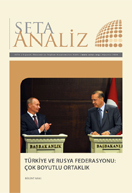One often gets this question from academics and experts: What will be the framework of international relations in the 21st century? Will it be determined by "hard instruments" such as energy, security and population?
Or will it be shaped by "soft instruments" such as education, culture and diplomacy? The "framework" questions always assume some large and clumsy structures. But Turkish foreign policy over the last few years shows that style matters as much as substance and structure.
Turkey's emergence in its proximate region as a regional player, facilitator and economic power is due to both ideational notions and politico-economic imperatives. It is obvious that Turkish policymakers are looking at Turkey and the region with a new vision: Our geography is integrated from Europe and the Balkans to the Caucasus, the Middle East and Central Asia. Secondly, international relations are not only about national interests or armies but also about history, culture, religion and shared memories. Thirdly, the global power balance between the one superpower, i.e., the US and the other great powers such as Russia and China keeps changing, creating new vacuums and crisis situations. The countries in the region, including Turkey, carry the burden of these "systemic crises" everywhere, from Iraq and Georgia to the Afghanistan-Pakistan region. Furthermore, the relative shrinking of Europe as a source of new ideas and bold policies also contributes to this situation whereby new actors and players appear on the stage with new and fresh ideas.
But there are also political and economic necessities that force Turkey and countries like it to forge a new set of policies on issues ranging from regional cooperation to alternative energy. The Turkish economy is the sixth largest in Europe and 17th in the world. Such an economic volume requires political stability. It is not only natural but rational for Turkey to try to attract the Gulf capital, Arab tourists and other economic players in the region. This is what other countries, including Europe, had done in the 20th century. Turkey's own security concerns also require active diplomacy in the region. While the Kurdish issue must be solved through a political settlement that should include some sort of general amnesty for the outlawed Kurdistan Workers' Party (PKK) fighters, the terrorism side of the problem has to be dealt with through the means proper to it.
Now, in all of this, style is as important as substance. Turkey is just beginning to assert itself in the region, and it will take a while before it becomes an agenda-setting player. For the time being, Turkey is a crisis manager, a facilitator, an emergency unit. Turkey is mentioned only in relation to crisis situations in the region. One day it's the Syrian-Israeli talks; the next it's the war on Gaza or internal strife in Lebanon. One hardly hears a "crisis-free" discussion of Turkey in the world media. This is likely to change if and when Turkey moves to the next stage and begins to assert itself as an agenda-setting actor in the region.
Yet the "Turkish style" of talking to everyone, being rational, avoiding confrontation and engaging all actors, including the outcast, will probably remain as the most important asset of Turkish foreign policy for all countries in the region, as well as for the Europeans and Americans. As far as style is concerned, Iran sees confrontation as the most effective way to open up space for itself. Arab countries lack in creativity and subtleties. The Saudis and the Qataris are showing signs of a new style of regional policy, but they lack the self-confidence required to deal with the tough issues of the region. The "Turkish style" is being watched closely by both Arabs and Iranians.
As valuable as the Turkish style is, though, an enduring policy in the region requires more than responsible reactions to emergency situations. Turkey cannot be content with being an emergency unit for stopping bleeding and handing the patient over to another surgeon. We have seen over









